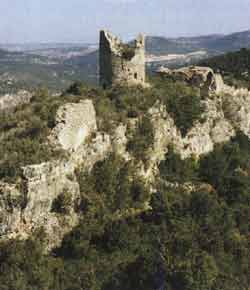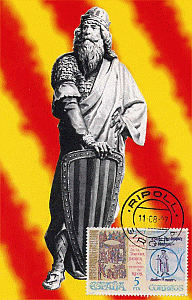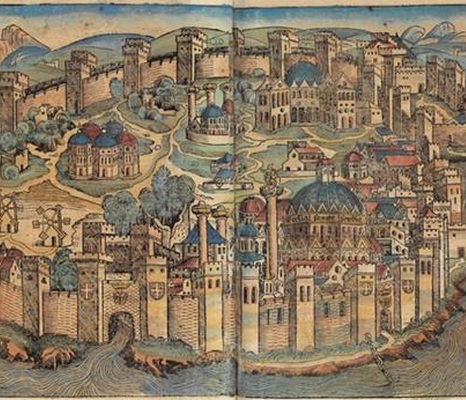Further conferring on frontiers
Part of the reason that the report on our first conference took so long to come is the amount of other stuff your humble author (Jonathan Jarrett) has been doing, and no small part of this has also been to do with medieval frontiers—who'd'a thunk? And not the least of it was another conference the next month, Boundaries and Frontiers in the Middle Ages, on 4 and 5 May 2018, this one different from ours in three important respects: firstly, it was in Nottingham; secondly, it was all postgraduate papers except the keynote; thirdly, one of our speakers, Marco Panato, was here one of the organisers; and fourthly, flatteringly, they asked me to give the keynote address!
Now, this was more challenging than you might think as the keynote was scheduled at the end of the first day's sessions. So, firstly I had to keep people awake and not too conscious that I was between them and dinner, but secondly I had to follow a whole rook of very good and clever papers and still sound impressive. Whether I did or not, only they can say, but this is what I was up against:
- Esther Lewis, 'The Parish, Suburb and City: A Discussion of Boundaries in the Pious Lives of Fifteenth-Century Bristolians'
- Tim McManus, 'The Disgusting Languedoc: Boundaries of the Mind and the Revival of Heresy in the 12th Century'
- Virgina Ghelarducci, 'Behind That Wall: Jewish Communities and Ambiguities of Neighbourliness in Medieval Spain
- Mark Robinson, 'Men of Blood: The Church’s Textual Response to Mercenary Violence, 1179-1215'
- Christopher Booth, 'Physician, Apothecary, Surgeon or Quack? The Medieval Roots of Professional Boundaries in Later Medieval Practice'
- Alessandro Carabia, 'Living in a Frontier Region in Late
Sixth Century Byzantine Italy' - Callum Watson, 'Crossing the Boundary Between Scottish and English in Barbour's Bruce
- Carl Dixon, 'The Teeth of the Taurus: Understanding the Frontiers of Asia Minor, c.650-950'
- Alex M. Feldman, 'Bullion, Barter and Borders in the Rus’ Coinless Period, 11-14th c.'
Faith-Based Boundaries
Occupational Boundaries
Dividing and Connecting Polities
As this was a gathering organised by the Midlands 3 Cities Consortium, students from Nottingham and Birmingham predominated, and did their respective universities credit. (The speaker from the third city, Leicester, could not attend, which was a shame not least as I'd tried to anticipate his paper in my own...) A whole range of different periods, sources and techniques were on display, from network analysis of Bristol parish communities through trauma theory, Jewish intellectual history, canon law, medical regulations, fortress archaeology, literary criticism and good old-fashioned textual analysis, as well as some numismatics, and frontiers appeared in every case, but of so many different kinds. Where our conference had stuck fairly tightly to a geopolitical understanding of the frontier, here conceptual and ideological frontiers buzzed more loudly, and the interaction of the different papers was all the livelier for that. Perhaps not every idea bruited here had yet found its perfect home in the materials, but it was all good to think with.

The Castell de Pinyana, Querol Alt Camp, Catalonia, photo by Ricardo Ballo from the excellent site Catalunya Medieval
For my part, I gave a speech entitled 'Local Élites and Frontier Lordship, in Medieval Iberia and Beyond', reprising an article of mine that never came out (a story I shall some day tell in my other Internet place) but asking, essentially, when a ruler of an expanding power wants to engage a settlement or polity on their borders into their own polity, how does that work? Many of the obvious answers fail on a frontier: ideas that this ruler somehow should rule here obviously weren't working before, so what would activate them now? The presence of an armed force is one obvious answer, but how do you make it keep working after you've had to take the armed men away? Consensus has to be built, but we don't always think about how. I pursued these questions primarily using my beloved Christian-Muslim frontier in the Iberian Peninsula of the central Middle Ages, but drew comparisons with the Byzantine Caucaus of the tenth century and Mercia in the time of King Offa. I was also using this to work out some stuff I was writing at the same time about how Count Guifré the Hairy, no less, of Urgell, Cerdanya and eventually Barcelona, Girona and Osona, managed exactly this feat in the frontier Catalonia of the late ninth century. When this work comes out, it will come out in Catalan, so may not be as accessible as the reader here might wish, but I'm sure the ideas will reappear somewhere else, ideally as I rewrite that old article for a better future...

Count Guifré the Hairy as depicted on a Catalan postcard 1987, image source now lost
Anyway, after that there came the conference dinner, which was an odd experience for me. Not only have I never been a keynote speaker before, so never been the guest of honour in this fashion, but one of the other organisers had been an undergraduate pupil of mine, two jobs and many years ago. Thankfully they remembered me fairly kindly, but it all went together to soothe the troubled academic ego very nicely. Maybe, maybe I am doing some good in what I do...
Anyway, such matters of conscience aside, the conference was not over and resumed the next day with this running order:
- Christopher Tinmouth, 'Frontiers of Faith: The Impact of the Insular British Frontier upon the Identity of Furness Abbey'
- Harry Wilkinson, 'Between Day and Night in Anglo-Saxon England'
- Robin Alexander Shields, 'The Epirote Frontier – the Republic of Venice and Carlo II Tocco'
- Katherine Rich, 'High Paths, Poetic Feet: Walking the Boundaries in Saga Verse'
- James Aitcheson, 'Dreams Come True: Predicting the Future in Late Anglo-Saxon England'
- Julia O'Connell, 'Emotional Boundaries in Chaucer’s Book of the Duchess'
- Markus Eldegard Mindrebø, 'Boundaries of Female Agency in the
Ynglinga Saga'
"Real" Boundaries
Conceptual Boundaries
Again the breadth of conception and bravery stands out, and I thought all the speakers made a good case for the frontiers in their material. The closing speaker, James Smith, the third organiser, had a challenge ahead of him to draw all of this together and did surprisingly well, eschewing the definition of 'frontier' or 'boundary' which, as he rightly said, none of us had really offered and instead drawing out some common characteristics, which are worth thinking with:
- frontiers are universal: there is no time or place without them;
- they have no agreed spatial form, not necessarily being any of linear, zonal, bounded, graded, marked or unmarked;
- they are specific, being defined partly by their local situation;
- they can change the ways that people on or near them behave by their existence;
- they can almost always be crossed, but it's not necessarily easy to do it, and never nothing, or there is no frontier!
- And, obviously, they lie between things, even when those things don't actually connect.
To James's credit, those are all quite hard to argue with – not impossible, of course, but admirably tough – and I'm afraid I found this so thought-provoking that I rather hogged the following discussion. Hopefully others learnt a little from me, but I had certainly come away impressed and thoughtful and very happy to have been invited. May all such work on frontiers be as lively and free-thinking!

